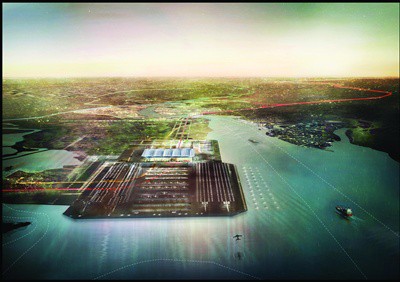It should surely come as a surprise to nobody that the Airports Commission has refused to shortlist plans for a four-runway hub airport in the Thames Estuary. The idea was always doomed; and it seems improbable that its most vocal supporter, London Mayor Boris Johnson, didn’t know this.
It’s undoubtedly a bold plan, and not without logic. You could go as far as to say that if you were designing a city like London from scratch, it would be the right option. But we aren’t designing London from scratch, and the fatal flaw in the Estuary Airport plan is that Heathrow already exists.

Not only does it exist, but it employs tens of thousands of people directly and more tens of thousands in associated jobs in logistics, hospitality and other connected services in West London, not to mention all the businesses which are located in the area because if their closeness to Heathrow. And not only that, but billions of pounds of investment have been sunk into the airport in the past few years, with the construction of Terminal 5 and, more recently, the rebuilding of Terminal 2.
Even taken alone, those facts would probably be enough to scupper any plan to close the airport and relocate London’s hub elsewhere. Add in the environmental impact of building a huge island in the tidal estuary of one of Britain’s biggest rivers; its impact on the coast of the Southeast; the fact that it’s close to a major nesting site for birds (and this isn’t just airy-fairy what-about-the-poor-birdies environmentalism; birds and aircraft really don’t mix) and the presence near to the proposed site of the wreck of the wartime transport ship SS Richard Montgomery and the 1,400 tonnes of high explosives which remain on board and are so unstable that they could explode if the ship shifts on the tide; and it was pretty obviously never going to fly (if you’ll excuse the pun).
Even all of Boris Johnson’s fabled ebullience wasn’t going to be enough to overcome these factors, and he had no direct influence here; he’s Mayor of London, and ‘Boris Island’, as it would have inevitably and wearingly been called, wouldn’t have been in London; it would have been in Kent. So all he could do was cheerlead and commission studies into the plan to aid his cheerleading; these, according to one estimate, have cost Londoners around £5.2m.
As Johnson was always intending to leave the Mayoralty at the next election in 2016, he would never have to campaign on a pledge to close Heathrow and build an estuary airport, and it never does any politician any harm to be associated with a visionary plan; especially if they’re a conservative politician (Johnson has based his career and persona, which are much the same thing, on being an atypical conservative). Remaining a vocal critic of Heathrow expansion will also do him no harm in his plan to stand for parliamentary election in Uxbridge, although with many local residents employed at or because of Heathrow, he probably won’t mention too often that he wanted to shut the place altogether.
So have we seen the back of Boris Island? The man himself says we haven’t; the Commission’s refusal to shortlist is a temporary setback, he says; and Norman Foster, whose architecture practice drew up plans for the proposed airport, says the decision ‘calls into question the validity of the Commission.’ Presumably if Johnson wins his parliamentary seat he plans to raise the issue in the next Parliament. Cynics, of course, might say that the whole business of establishing the Commission was a tactic to delay the necessity of making a decision until the next Parliament to avoid having to put anything about it into election manifestos.
Building a new airport would be an enormous engineering undertaking, although not one without global precedent. But it seems likely that what will happen is a predictable compromise of a new runway at Gatwick and, in due course and over much protest, another one at Heathrow.




Poll: Should the UK’s railways be renationalised?
All public service companies should be nationalised for many different reasons, particularly railways, not the least because the tax payer has already...